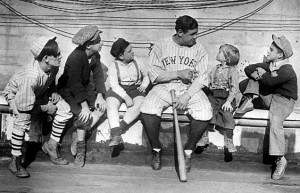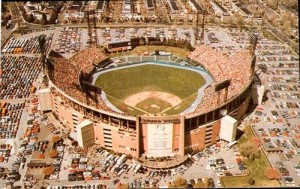
Babe Ruth, with fans (in 1924). Can the average kid today afford to buy a ticket to a Major League Baseball game?
THE ANSWER TO THAT, OF COURSE, IS NO;
BUT THERE’S ALWAYS TV BROADCASTS
AND SATELLITE RADIO TO FILL THE GAP
Being a sports fan in Baltimore has changed
from what it was like in the ‘good old days’
— but are things better now? or worse?
GAMES MORE ACCESSIBLE, BUT REMOTE
By David Maril
Despite the Orioles failing to qualify for post-season play, there’s a sense Baltimore is once again a prospering big league professional-sports city.
The Ravens, impressively adding their own chapters to the great local football legacy the Colts created, are defending World Champions.
The Orioles did go into an offensive tailspin the last month of the season. But that doesn’t diminish the fact the team turned the corner from over a decade of losing. Two straight winning-seasons and a number of promising young players, especially on the mound, mean that, as the late Curt Gowdy used to say, the team’s future is in front of it.
It’s been great to hear fans talking as much about the Orioles as the Ravens. It’s a bit of a reminder of the old days in Baltimore, during the late 1950s, 60s, 70’s and early 80s with the O’s and Colts.
If you are a young sports fan, however, there’s a big difference from those Baltimore glory days of yesteryear. In most cases, unless the tickets relate to a gift or business-association deal a parent has arranged, it’s unaffordable for most kids these days to attend more than a few baseball games a season on their own.
At least in Baltimore there are still plenty of opportunities to attend games if you can afford the ticket prices. However in a city like Boston, with small, overly hyped Fenway Park, tickets are so scarce many Red Sox fans wait to see their team play in Baltimore, then fly down on Southwest Airlines and stay at Inner Harbor hotels.
A ‘BASEBALL SPECIAL’ TRANSIT BUS
When I was a kid, it was easy to see the Orioles, who were coming off their first World Championship in 1966. On any Saturday, you could jump on a “Baseball Special” transit bus with your friends, watch batting practice and a doubleheader, spending 10 hours at Memorial Stadium.
For under $3 you were able to purchase a Section 1 upper-deck seat behind home plate, with a bird’s eye view of every pitch. If in the first four rows, you were still close enough to the field to snag a foul-ball souvenir.

Memorial Stadium, view from behind home plate. The home run ball hit out of the stadium by Frank Robinson in the second game of a Sunday doubleheader in 1966 against the Cleveland Indians landed in the parking lot at upper left.
The Sunday Frank Robinson hit the only baseball out of Memorial Stadium, I bought my doubleheader ticket 15 minutes before the game. Now, even with luxury boxes and corporate-priced tickets, the break-even point for many teams is closer to three million than two.
It’s not so easy, or affordable anymore, buying decent tickets.
When the Bullets were playing at the Civic Center with Earl “The Pearl” Monroe, Wes Unseld and Gus Johnson, student passes were available. For a dollar, if you were in high school, you could get into most games and sit in any seat that hadn’t been sold.
The NFL, of course, was always a tough ticket in Baltimore. Until Robert Irsay was readying to hijack the Colts out of town, NFL tickets were hard to come by. However, any similarity between costs then and what season ticket holders willingly pay now is purely coincidental.
AVID FANS HAVE FEWER OPPORTUNITIES
The reality is that few kids who are avid fans today have the opportunities to see as many games in person as we did a generation or two ago.
However, there are plenty of advantages young fans have today that oldsters never had.
For example, take pro football. Until the NFL’s television blackout rule was modified and then finally eliminated, homes games were not shown on television.
I remember, in 1966, straining to pull in Washington’s Channel 9 to watch, through a snowy TV picture, as Gino Marchetti was honored in a pre-game ceremony at his last home game at Memorial Stadium.
The broadcast wasn’t shown on WMAR, the city’s CBS affiliate.
Today, no matter where you live, every NFL game is available — as long as you are willing to pay — on television or computer.

The Mid-Atlantic Sports Network (MASN) is co-owned by the Baltimore and Washington, D.C. baseball franchises.
Until Home Team Sports, which was succeeded by MASN, the Orioles usually televised no more than 50 games. Today however, almost every O’s game, or that of any other Major League Baseball team, can be seen at home.
If you are a transplanted West Coast National League baseball fanatic living in Baltimore, subscription baseball packages allow you to see the Dodgers, Giants and Padres every day.
Satellite radio is another option, broadcasting every Major League Baseball game.
In the old days, the true baseball addicts were reduced to pulling in late-night static-filled radio broadcasts from places like St. Louis, Detroit, Baltimore and Pittsburgh on 50,000-watt AM radio stations.
Overall, kids from the earlier days, however, had it all over today’s young fans as far as opportunities to watch sports events in person.
But who is to say which is better? If you are a kid, would you rather be able to see every game you want on television or have unlimited opportunities to attend games in person?
The only accurate answer is, things are different today for kids growing up as sports fans. It’s open for debate whether things are better or worse.
davidmaril@hermanmaril.com
“Inside Pitch” is a weekly opinion column written for Voice of Baltimore by David Maril.
EDITOR’S NOTE: Mid-Atlantic Sports Network — a/k/a “MASN” — is a regional sports network co-owned by the Baltimore Orioles’ and Washington Nationals’ Major League Baseball franchises. The network televises every available game of both teams, live and in high-definition, and is available in a seven-state region, including Washington, D.C., from Charlotte, N.C. to Harrisburg, Pa.
CHECK OUT LAST WEEK’S “INSIDE PITCH” COLUMN: click here
…and read previous Dave Maril columns by clicking here.






September 28th, 2013 - 2:21 AM
Nice column.
October 3rd, 2013 - 4:08 PM
On behalf of Dave Maril, VoB appreciates your Comment. —Ed.
October 5th, 2013 - 12:02 AM
[…] Voice of Baltimore by David Maril. CHECK OUT LAST WEEK’S “INSIDE PITCH” COLUMN: click here …and read previous Dave Maril columns by clicking here. Filed under: Top Stories […]